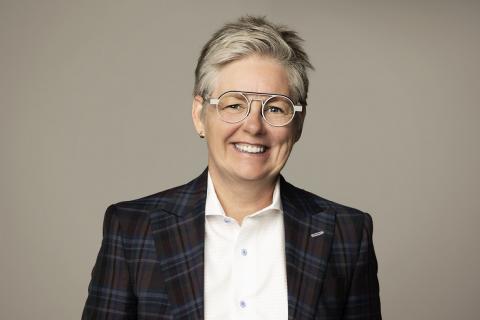Breadcrumbs
President Brown: Truth and Reconciliation Week at YukonU

Committing ourselves, personally and professionally, to the work of reconciliation with Indigenous peoples across this country is the most vital work of our time. Hearing and absorbing the truth of the ongoing and inter-generational impacts of Indian Residential Schools and other colonial policies on First Nations people, Métis and Inuit in Canada are essential to the reconciliation journey.
This summer, we were confronted with the confirmation of unmarked graves at Residential School locations across Canada. So many children who were taken and housed in these places never returned home. The grief and trauma of this truth is still felt today in every First Nations, Métis and Inuit community.
As former senator Justice Murray Sinclair said, “It is precisely because education was the tool of oppression of Aboriginal people, and miseducation of all Canadians, that we have concluded that education holds the key to reconciliation.”
As an educational institution, it is important we honour this history and this National Day of Truth and Reconciliation (TRC Day) and Orange Shirt Day on September 30 by cancelling classes and closing services. The four Ayamdigut Campus flags that can be lowered will be at half-mast from Monday morning until end of business Friday in honour of the holiday, those Indigenous children who died, those who survived and their families.
Orange Shirt Day is an Indigenous-led grassroots commemorative day inspired by the story of Phyllis Webstad, a Northern Secwpemc (Shuswap) from the Stswecem'c Xgat'tem First Nation in BC. At age six, Phyllis attended her first day at residential school dressed in a new orange shirt, a gift from her grandmother, and was stripped of her clothes and given a uniform to wear. The orange shirt was never returned and is now a symbol of the stripping away of culture, freedom and self-esteem experienced by Indigenous children over generations.
I encourage each YukonU student, staff and faculty member to engage with the activities honouring TRC and Orange Shirt Day this week.
The teams in First Nations Initiatives, Innovation Commons and Campus Store, as well as individual faculty and staff, have worked hard to provide multiple pathways to enhance our understanding. Every step each of us takes towards increasing our knowledge about this shared history is a step closer to a brighter future for everyone on this land we now call Canada.
Facing this truth is challenging and I encourage each of you to be kind to and care for yourself and one another as you embark, or push deeper, on this journey. Be aware of supports in place and reach out to them as you may need.
SUPPORTS:
At YukonU
-
Students: Contact the Connect2YukonU team to connect with a counsellor, an Elder or services for Indigenous students. Call or text 867 456 6996 or email connect@yukonu.ca.
-
Employees: Visit My Family Assistance Program on MyYukonU for more details or contact our two Employee Assistance Program providers directly at Nimco and Associates 867.668.3277 or 867.668.6059 / Family Services Employee Assistance Program (FSEAP) 1-800-667-0993 fseap.ba.ca (Password: 2bwell).
Beyond YukonU
-
National Indian Residential School Crisis Line: 1-866-925-4419.
-
First Nations and Inuit Hope for Wellness 24/7 Help Line: 1-855-242-3310
-
Indian Residential Schools Resolution Health Support Program for Survivors and their families: 1-800-464-8106
-
CAIRS (Committee on Abuse in Residential School) 4194, 4th Ave. Whitehorse. (867) 667-2247
-
CMHA Yukon's support line: 1-844-533-3030
-
Rapid Access Counselling supports in Whitehorse and all MWSU community hubs (867) 456-3838
-
Crisis Services Canada (national, 24/7): 1-833-456-4566, or text 45645
Please understand that while the activities this week are important, they will weigh most heavily on Indigenous friends and colleagues, who will be grieving the children who did not return home and the effects that this trauma has had on their families and communities. Give space and be generous with them, and most of all do not burden them with your curiosity about how, why and where this happened; instead, bring your questions to the resources and activities this week.
Establishing this statutory holiday fulfilled just one of the 94 TRC Calls to Action. There are many more upon which progress can be made.
YukonU has grown to become a leader in reconciliation and Indigenization. We have much to be proud of, yet there is still much work to do.
Developing revitalized Indigenization goals for YukonU and a report card framework is one of the projects AVP Indigenous Engagement and Partnerships Chùsi Robin Bradasch has begun with her First Nations Initiatives team. Robin and her team have created a committee to seek input on this initiative—look for more info in the next few weeks.
Also, in the coming days and weeks, I will be connecting with First Nations leaders across the Yukon to hear directly their priorities for Yukon University and on Oct. 14 I will be meeting with the President’s Advisory Committee on First Nations Initiatives (PACFNI) for the first time.
The Yukon University Act is a visionary article of legislation that incorporates Indigenization throughout, and I am thrilled to be part of weaving this bold future where our goals are closely aligned with those of all the people we serve.
Sincerely,
Dr. Lesley Brown
President and Vice Chancellor
Yukon University